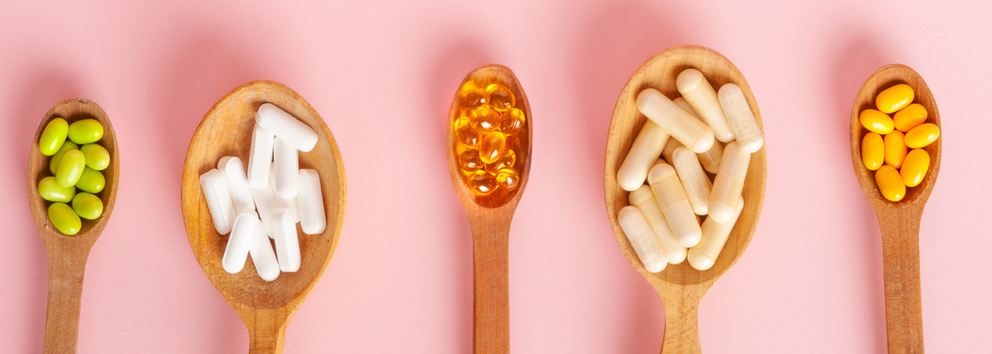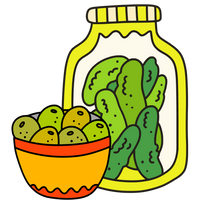
If you’ve been on social media lately, then you’ve probably seen an advertisement or influencer talking about a dietary supplement that can reduce bloating, give you energy and maybe even help you lose weight. You’ve been wanting to feel better for a while, and they sound so convincing. You want to give it a try, but you already have a whole kitchen cabinet dedicated to supplements you’ve tried and never stuck with. Maybe it’s time to take a different approach.
Have you heard of the OG of dietary supplements? It’s the one our ancestors intuitively knew was the key to gut health – fermented foods. They used lacto-fermented vegetables to create nature’s multivitamin!
So which should you take? Dietary supplements or fermented foods? Let’s break down probiotic foods vs. supplements to help you decide for yourself.
This article will explore the nutrient profile between fermented foods and common dietary supplements, key differences in absorption and effectiveness, and even break down the cost comparison. By the end, you’ll have a clear idea of why in most cases, fermented foods are likely the better choice for you.
Related articles: Health Benefits of Fermented Foods and Are Pickles Healthy?

Key Nutrients and Supplements for Gut Health Found in Fermented Foods
When it comes to maintaining optimal health in the 21st century, some kind of dietary supplement is usually involved. Our food, farming and eating practices are very different than that of our ancestors. We rely heavily on convenience foods and as a result most people aren’t getting all the key nutrients needed for overall health. Supplements can be a way to help replace nutrients we aren’t getting from food. Have you considered using fermented foods instead of dietary supplements? Here’s a breakdown of key nutrients found in fermented vegetables, which also happen to be the foundation for gut health.
Probiotics
Probiotics are live bacteria that support gut health by maintaining a balanced microbiome. They’re the good type of bacteria and you need to have more good guys than bad guys if you want to feel your best. A healthy gut microbiome is the foundation for digestion, the immune system, and even mental health.
Aside from probiotic supplements, you can get probiotics from these foods: some yogurts, kefir, sauerkraut, kimchi, miso, and other fermented foods. For more options, check out our post on Top 11 Probiotic Foods for Optimal Gut Health.
Fermented foods provide a larger variety of beneficial bacteria than dietary supplements, and your gut thrives on that microbiome diversity!
Prebiotics (aka Fiber)
Fiber is a type of carbohydrate that the body cannot digest. It helps regulate the body’s use of sugars and keeps hunger and blood sugar regulated. Prebiotics are soluble fiber that feeds your gut bacteria, and you can’t have a healthy gut without enough fiber.
There is an abundance of foods that provide an excellent source of prebiotics: beans, seeds, fruits, vegetables, and fermented foods. A few of our favorites include Olive My Pickle Fermented Foods, chicory root, dandelion greens, garlic, onions, bananas, barley, oats, apples, flax seeds, and seaweed.
For more info on prebiotics, you’re gonna want to read our article on The Best Fiber for Gut Health.
Digestive Enzymes
Another popular dietary supplement that can be replaced with fermented foods is digestive enzymes. Supplements like papaya enzymes and hydrochloric acid (HCL) are common ones that help break down food into nutrients so your body can absorb more efficiently. Common signs of enzyme deficiency include gas, bloating, and undigested food in your stool – Not fun! Fermented foods are enzyme rich, along with raw fruits and vegetables. If you don’t have enough enzymes, it will be hard for your body to absorb the vitamins and minerals we cover below.
More on enzymes here: How to Reset Your Gut Health and When to Eat Fermented Foods
B Vitamins (B5, B6, B12)
B vitamins play a crucial role in energy production, brain function, and the formation of red blood cells. Some of the big ones that people often take as a dietary supplement are B5, B6, and B12.
Did you know B12 is a byproduct of the fermentation process? It’s also one that is difficult for most people to absorb in supplement form, and more bioavailable in fermented foods. This just means your body can utilize it more efficiently than in synthetic forms found in dietary supplements.
Electrolyte Minerals
Everyone’s using electrolyte drinks and powders these days. But why are they important? Electrolytes like sodium, potassium, and magnesium regulate hydration, nerve function, and muscle contractions. They’re great for hot days and post workout.
Fermented foods offer natural sources of electrolytes without the added sugars and artificial ingredients found in many dietary supplements.
Read more about electrolytes in pickle juice: Staying Hydrated with Electrolytes: The Pickle Juice Benefit and Fact or Fiction: Learn the Truth About Pickle Juice and Electrolyte Drinks
Vitamin C
You may think of this one when you’re sick because Vitamin C supports immune function, collagen production, and antioxidant protection. Citrus and fermented foods like sauerkraut and kimchi are great food sources instead of taking a daily pill.

Vitamin K
Specifically, K2 is an important nutrient found in fermented foods. It protects heart health and supports bone health in older adults. It may not be the most common dietary supplement, but important, nonetheless. It’s another nutrient created during the fermentation process and also found in leafy green vegetables.
What Are the Main Concerns with Dietary Supplements?
While both dietary supplements and fermented foods provide essential nutrients, there are key differences in how they work within your body. Let’s break it down!
Absorption: Nature Knows Best
Unpopular opinion about dietary supplements – most pills and powders on the market are not worth your money!
Your body is designed to digest and absorb nutrients from real food, not synthetic pills. Fermented foods provide nutrients in their most natural and bioavailable form, meaning your body can absorb and utilize them more effectively. In contrast, the absorption of nutrients from dietary supplements can be inconsistent at best, and certainly less efficient due to their synthetic nature.
We like to refer to fermented foods as nature’s multivitamin because they have such a wide array of nutrients in their most natural form.
Regulation: What’s Really in Your Supplements?
We hate to be the one to break it to ya… There is NO regulation on dietary supplements. This means the manufacturer can put whatever they want into a capsule and call it a day. They are not being required to verify whether what’s described on the label can actually be found in the product.
There are some good ones on the market, but many supplements for vitamins, minerals, and probiotics just make for expensive pee (sorry, we had to go there)!
Government regulation of probiotics in the United States, for example, is complicated. Depending on a probiotic product’s intended use, the FDA might regulate it as a food ingredient, a drug, or a dietary supplement. Most probiotics are sold as dietary supplements, which don’t require any FDA oversight or approval before they are marketed.
In an analysis of various probiotic brands sold in the U.S., Consumer Labs found that 5 of the 19 brands examined did not contain the number of live microorganisms stated on their label. What’s worse, some of them contained contaminates from common harmful bacteria or mold.
When it comes to dietary supplements, because there is no guarantee you’re ingesting exactly what the label claims, it’s vital to select products from well-researched and credible brands.
At Olive My Pickle, our fermented foods are verified by third-party lab testing to ensure each serving contains up to 14 billion CFU of lactic acid bacteria. And since this is in REAL FOOD form, your body is designed to absorb all those good bacteria!
Enjoyment: The Experience of Eating
Let’s face it – taking pills is a hassle, and it’s easy to forget to take them. Fermented foods, on the other hand, are a delicious and versatile addition to your snacks and meals. Whether you’re topping a salad with sauerkraut or snacking on pickles, eating real food is FUN and enjoyable – something that supplements simply can’t match.
No more pill and powder bottles, setting reminders, or struggling to take a handful of pills every morning.
Just a small serving of fermented foods (like forkful of sauerkraut, a few olives, or half a pickle) is a powerful multivitamin that your body is designed to absorb! Remember, they’re not just full of probiotics, but also prebiotics, digestive enzymes, electrolyte minerals, and essential vitamins like Vitamin C, K, and B-Complex.
Cost Comparison: Fermented Foods vs. Dietary Supplements
Now, let’s talk numbers. Because even if you’re now convinced that fermented foods (in most cases) are a better choice than dietary supplements, cost is going to be a factor in your decision.
Good news – fermented foods win in this category as well!
Maintaining a regimen of dietary supplements can get expensive, especially if you’re trying to cover all your bases with probiotics, vitamins, and minerals.
There’s a lot of variances in cost of supplements on the market, but below we break down some averages comparing a one month supply of supplements to a one-month supply of fermented foods that offer the same nutrients.
Dietary Supplements:
| Probiotic Supplement | $40/month |
| Fiber Supplement | $30/month |
| Digestive Enzyme Supplement | $25/month |
| B-Complex Vitamins | $25/month |
| Electrolyte Supplement | $30/month |
| Vitamin C | $10/month |
| Vitamin K | $20/month |
Total cost: $180/month
Fermented Foods:
An Olive My Pickle Subscription Box with 6 items delivered to your door every 4 weeks is $71 (includes a variety of fermented foods rich in probiotics, fiber, enzymes, vitamins, and minerals).
Total cost: $71/month
Fermented Foods for the Win!
When comparing dietary supplements to fermented foods, the benefits of turning to nature are clear. Fermented foods offer a rich source of probiotics and nutrients that are more easily absorbed, made with all-natural ingredients, and way more fun to eat than pills or powders. Plus, they’re a more cost-effective way to ensure you’re getting the nutrients you need to support your overall health. So next time you’re looking to boost your wellness routine, consider reaching for a jar of your favorite fermented food instead of a pill bottle.
If you need a refresher on why probiotics and fermented foods are so important, check out the Top 7 Health Benefits of Fermented Foods.
With Olive My Pickle’s fermented foods, you get all the probiotics, prebiotics, digestive enzymes, vitamins, and minerals to support overall health – no pill bottles required. Choose your favorites and build a box today!
DISCLAIMER: THIS WEBSITE DOES NOT PROVIDE MEDICAL ADVICE
The content on this website is for informational or educational purposes only and does not substitute professional medical advice or consultations with healthcare professionals. Always seek the advice of your physician or other qualified healthcare provider(s) with any questions you have regarding a medical condition or treatment and before undertaking a new health care regimen.













